Background
- Rise of international corporations;
- Increased demand for skilled specialists;
- Arising ethical dilemmas related to staffing;
- Diverse policies used to solve these problems;
- Significant importance of international relations;
- Diverse stakeholders` groups as main actors.
The last several decades could be characterized by the increased significance of international corporations that are central players in the world of business. For this reason, the global intercourse and relations between these corporations acquire the top priority (Banai and Sama 221). At the same time, it also means that particular organizations have to hire employees from different countries to ensure that the peculiarities of local markets and cultures are taken into account and used to guarantee the best possible outcomes. Therefore, the rise of demand for international specialists precondition numerous ethical dilemmas related to staffing policies.
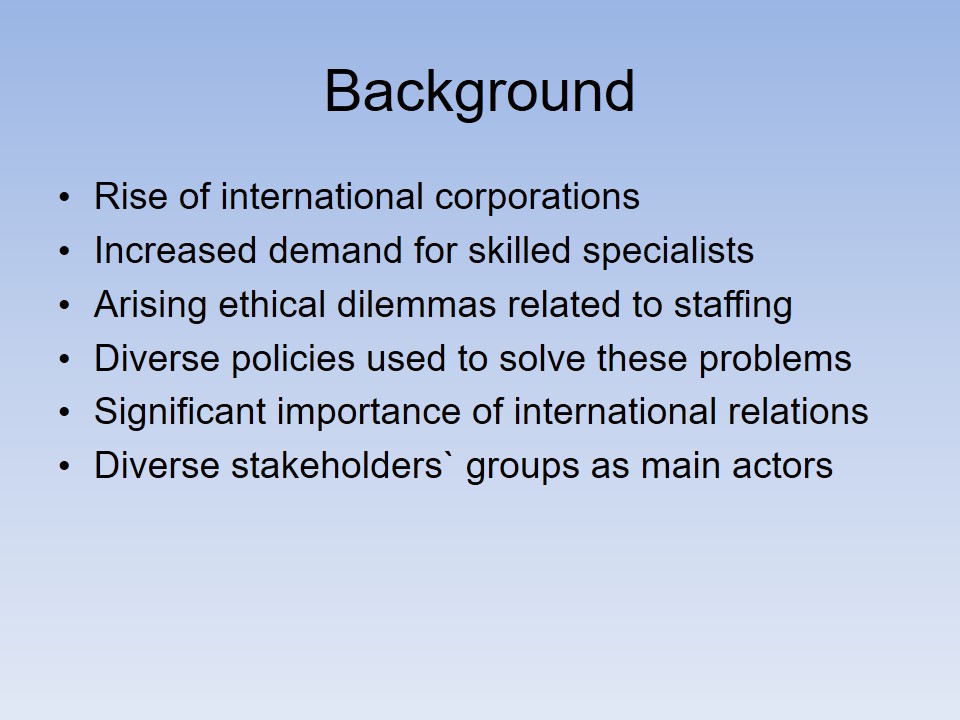
Central Ideas
- Existence of ethical rationale for specific policies;
- Investigation of ethical dilemmas acquires the top priority;
- Enhanced importance of efficient solutions;
- Better international cooperation;
- Economic rationality as one of impacting factors;
- Utilitarianism, moral rights, and distributive justice as central concerns.
The paper assumes that in the age of the rise of global international corporations international staffing policies acquire the top priority because of their impact on outcomes and overall efficiency. For this reason, the article suggests a conceptual framework according to which ethnocentric, polycentric, and geocentric staffing policies are closely related with the decision–making modes of instrumentality, bounded and economic rationality (Banai and Sama 221). This idea is investigated regarding the ethical dilemmas that might arise during the cooperation of international workers within one organization. (Banai and Sama 221). The authors also discuss potential applications of their idea to diverse frameworks that are used by the modern international corporations.
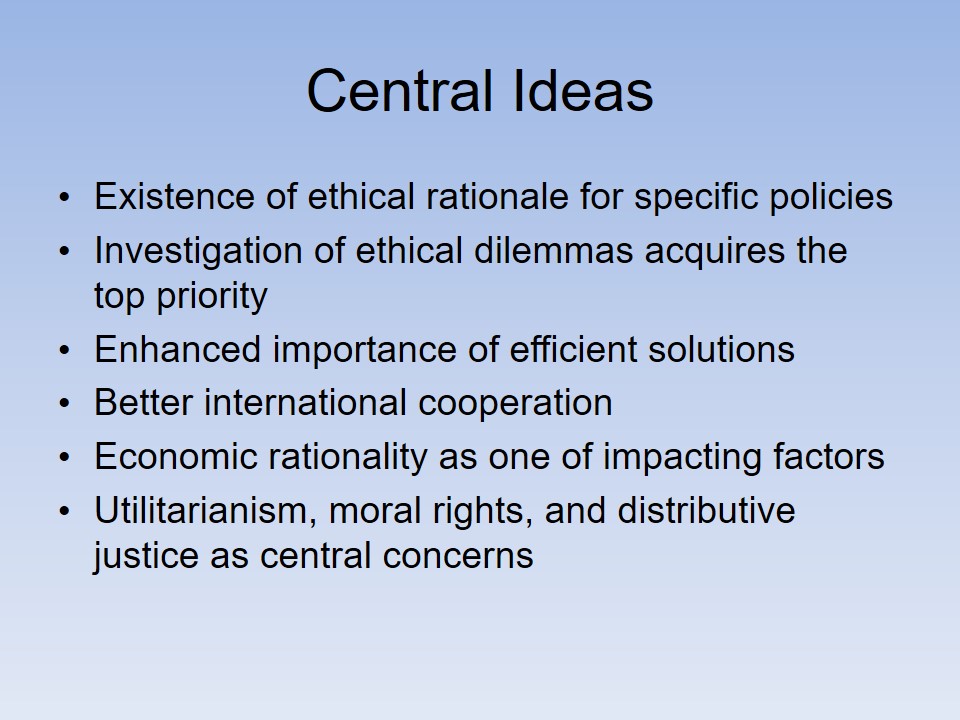
Purpose of the Paper
- Examine the three international staffing policies;
- Investigate a new framework that relates to underlying decision-making;
- Assess the ethical approach of every policy;
- Research ethical consequences of these policies;
- To offer guidelines for the implementation of decision making;
- To consider multinational corporations as moral agents;
- Philosophical approach to decision making regarding the ethical concerns;
- Investigate how the staffing policy is linked to decision making;
- Assess the key responsibilities and duties of MNCs;
- Conclude about the existing practices;
- Discuss future possibilities for implementation.
The pivotal aim of this paper is the examination of the tree international staffing policies within a new conceptual framework suggested by the authors (Banai and Sama 222). The given framework could be related to underling decision-making mode and ethical approach of each of the mentioned policies. The importance of the given purpose is justified by the fact that the bigger part of existing multinational corporations act as moral agents deciding what actions could be considered appropriate and should be cultivated (Banai and Sama 222). At the same time, there are diverse consequences of these policies that might result in the improvement or deterioration of final results. The authors are sure that the assessment of trade-offs is no more applicable regarding only managers (Banai and Sama 221). For this reason, the in-depth investigation of the given sphere becomes critical.
Additionally, the authors are focused on the idea that using the philosophic approach to study peculiarities of decision-making processes, investigators can understand peculiarities of the issue better. (Banai and Sama 222) In such a way, it becomes crucial to use the given perspective while conducting research and delving into the basic features of staffing policies in MNCs.
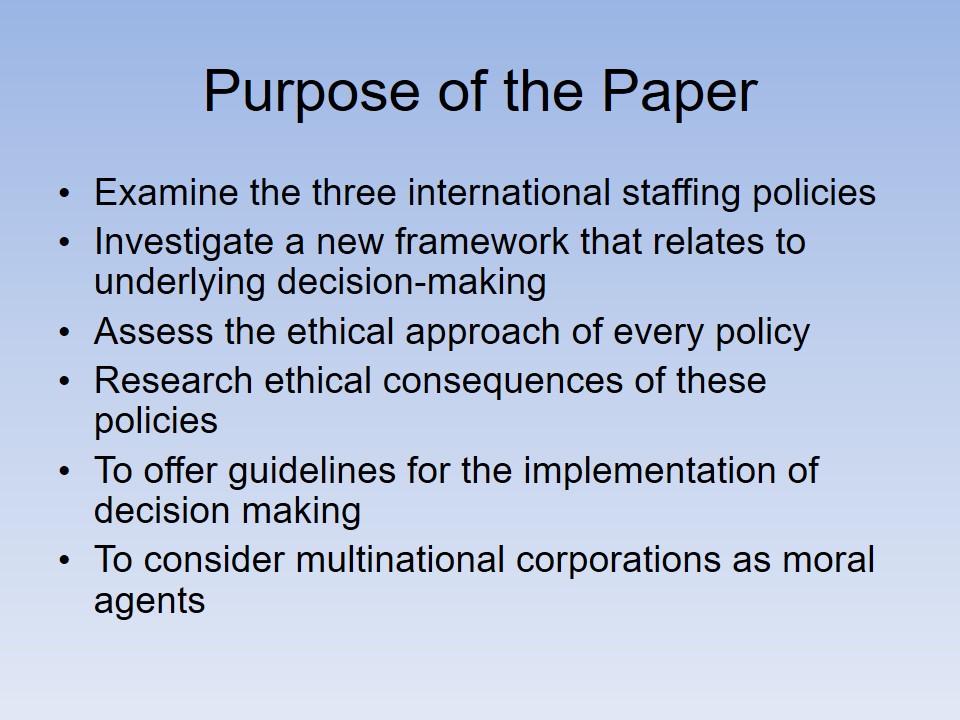
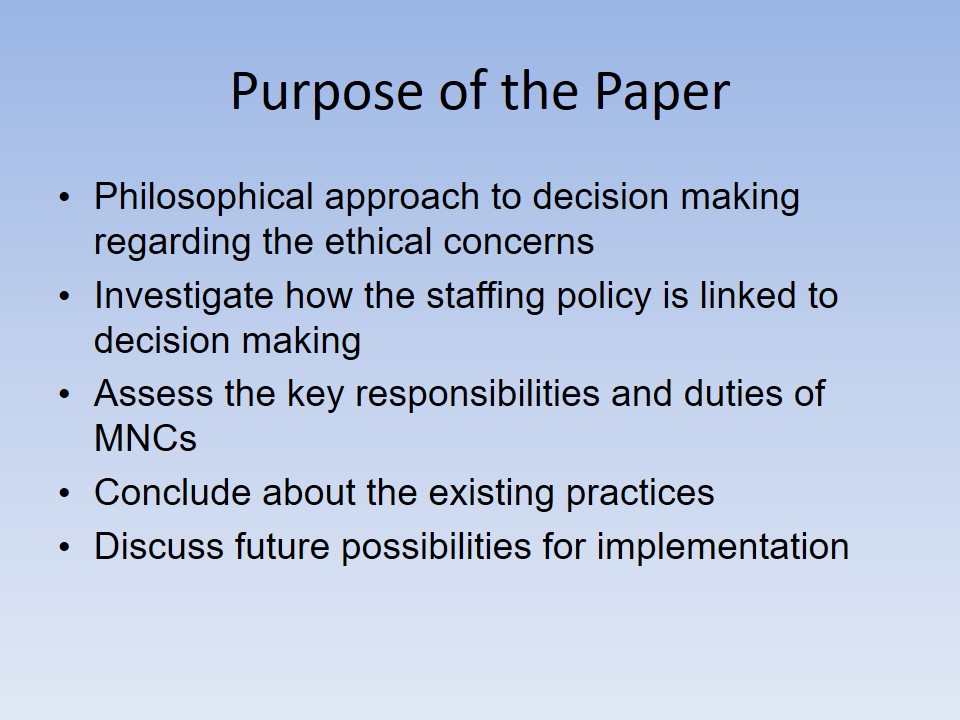
Theoretical Background
- Three basic staffing policies are available to MNC:
- Ethnocentric;
- Polycentric;
- Geocentric.
- Application of these might precondition improved results.
At the moment, the majority of multinational corporations can use the three basic staffing strategies that impact decision-making and the functioning of the company. These strategies are ethnocentric, polycentric and geocentric ones. Applying these concepts to the real-life conditions, corporations might alter and adapt these policies and apply their mix during the whole lifespan (Banai and Sama 223). The authors also assume that the choice of these policies is preconditioned by a set of reasons that impact the company throughout its functioning and which might not be even mentioned in the given paper. These might include bargaining power of the host country, the nature of technology transfer, impact of the local culture and mentalities, industry and market influences, etc. (Banai and Sama 223).
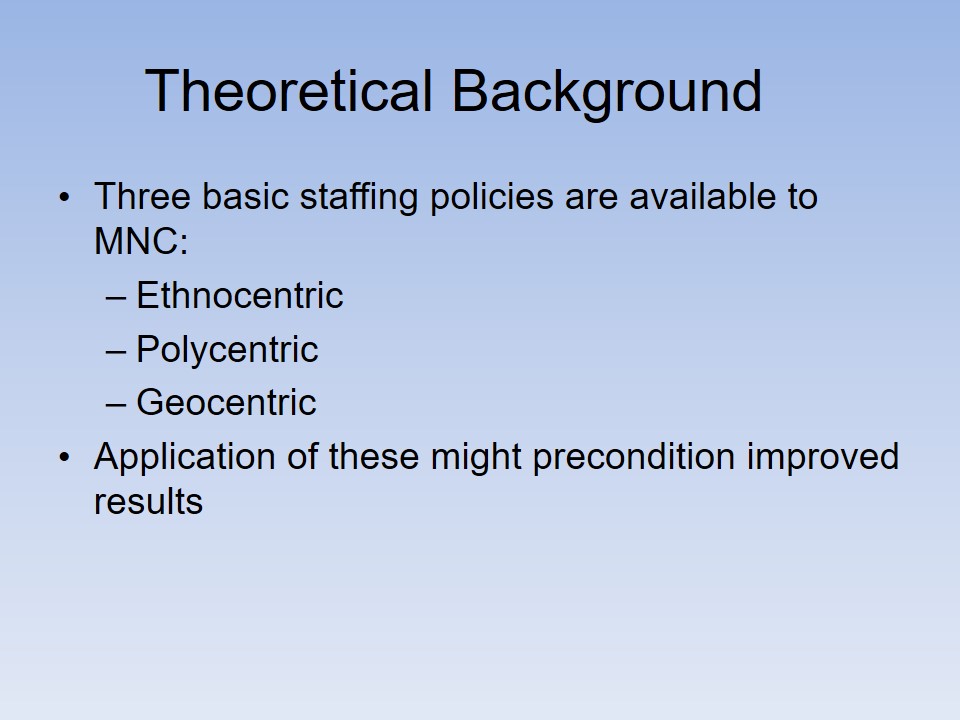
Ethnocentric Policy
- Top-level management positions are suggested to headquarter personnel.
- Preference is given to members of a certain group.
- Subsidiaries are managed by representatives of this category.
- Executive staff remains in the home-country.
- The role of home-country is emphasized.
The basic idea of the ethnocentric policy is the cultivation of the environment in which preference is given to headquarter personnel because of their belonging to a particular group that is associated with the company and the country of its origin (Banai and Sama 223). The given staffing policy also presupposes that the executive personnel remains in the home-country and manages subsidiaries located in different states (Banai and Sama 223). In such a way, this policy promotes the role of a home-country and deprive host country nationals of an opportunity to occupy leading positions. Being efficient in particular settings, this staffing policy might give rise to ethical concerns because of the disregard of a certain group of population.
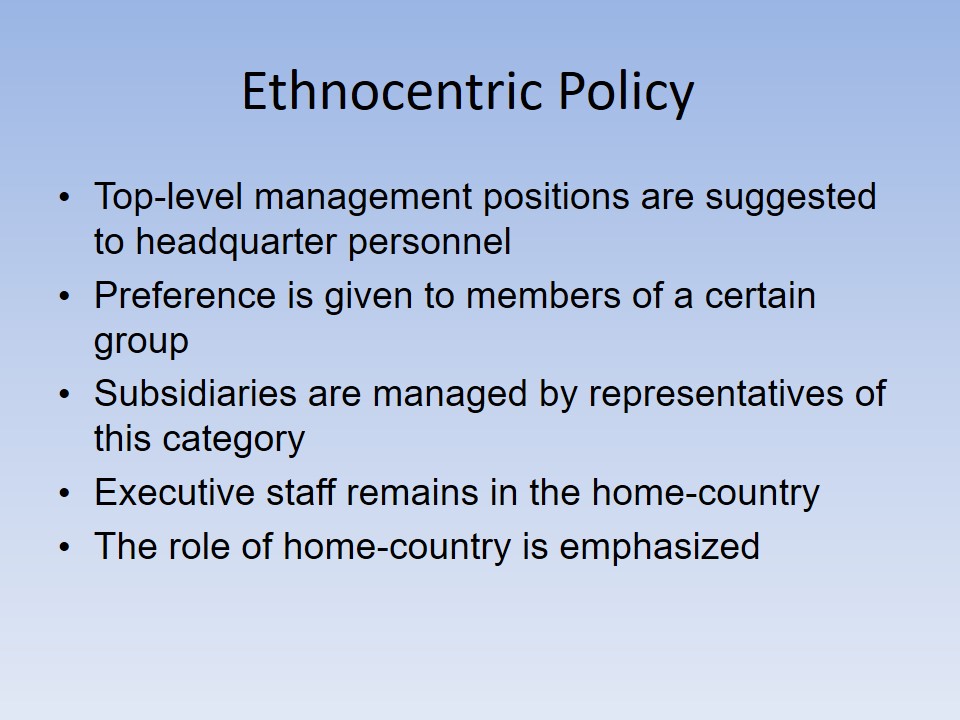
Polycentric
- Top management positions abroad are given to locals.
- At home, country nationals are suggested posts.
- Equal opportunities for both these groups.
- Opportunity to create a tolerant environment.
- Host and home country nationals have similar rights.
The authors state that another staffing policy that is accepted by multiple multinational companies nowadays is the polycentric one. It introduces the idea of the equal distribution of management positions between representatives of home and host country nationals (Banai and Sama 223). It could be achieved by suggesting top positions abroad to local people considering the fact that their knowledge of the peculiarities of the region will help them to align the enhanced functioning of the corporation. At the same time, at home, local workers occupy their posts and manage the company. This approach is also used in diverse settings with the primary aim to mitigate the negative impact that might be caused by the prevalence of a certain nationality (Banai and Sama 223). However, the authors admit that there are still several concerns connected with this idea.
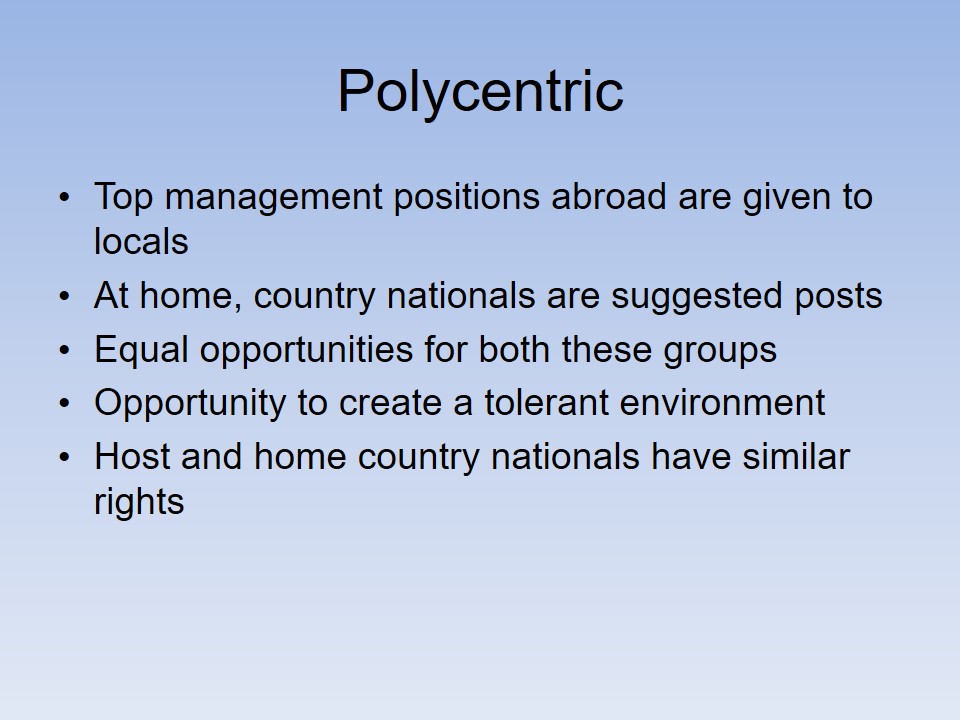
Geocentric
- All employees can get managerial positions.
- Nationality of applications is not considered.
- Top managers are selected from a pool of all workers.
- Competence is the only fundamental factor.
- Promotion of the international cooperation.
- Healthy environment within the collective.
Moshe and Sama also delve into the geocentric staffing policy which is now considered one of the most tolerant and efficient regarding the peculiarities of diverse regions in which companies function, their cultures, and workers` mentalities (223). The essence of this idea is the inclusion of all workers regardless of their nationality and provision of equal opportunities for their development. Forming a specific pool of employees characterized by the high performance and competence, companies select top managers and executives considering only their professionalism and skills (Banai and Sama 223). The given approach might be considered efficient and fair enough by diverse MNCs that function in diverse regions and aim at engaging local human resources in the cooperation.
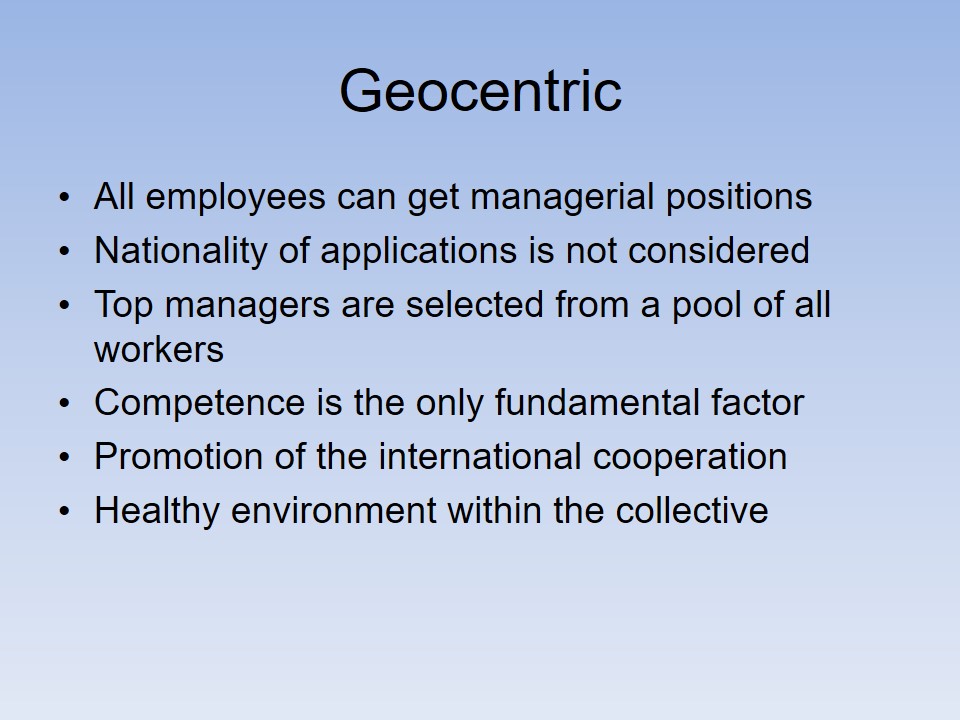
Correlation Between Ethical Dilemmas and Policies
- Particular decision-making models are used by MNCs.
- The choice of the model depends on diverse factors.
- Ethical dilemmas appear because of the used policy.
- Choice of the policy preconditions debates.
- High potential for discussion and analysis.
Considering peculiarities of the described policies, the authors state that their central interest in the paper comes from the ethical character of the above-mentioned approaches and their diverse impacts on the further evolution of organizations (Banai and Sama 223). The researchers are sure that particular ethical rationales precondition the choice of one or another policy (Banai and Sama 223). At the same time, all these staffing methods (ethnocentric, polycentric, and geocentric) might give rise to ethical concerns and dilemmas. For this reason, Moshe and Sama demonstrate their interest in researching this issue and its basic peculiarities regarding the modern MNCS and their functioning.
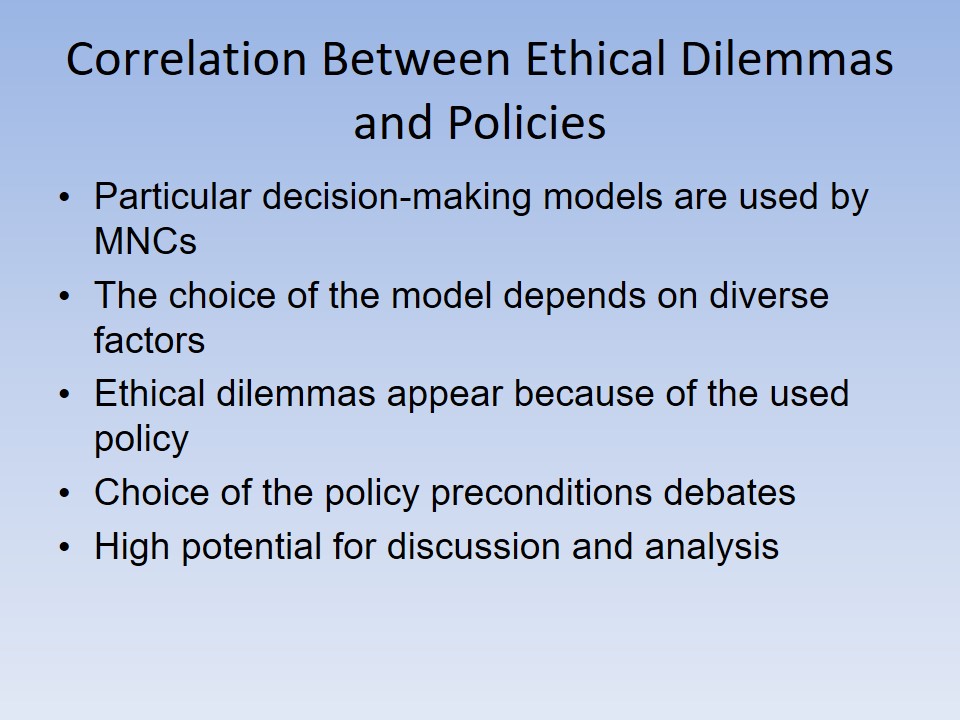
Decision-Making Modes
- The concept of decision-making modes.
- The level of decision-making and behavior is manifested.
- Three basic modes:
- Instrumentality;
- Bounded rationality;
- Economic rationality;
- Decision-making modes correspond to staffing policies.
The authors state that to analyze the benefits and drawbacks of every staffing policy, it is critical to investigate the concept of decision-making modes and its basic features (Banai and Sama 224). They state that the levels of decision making and behavior are interconnected (Banai and Sama 224). Thus, Banai and Sama also suggest the idea the basic modes of decision-making correspond to the three staffing strategies mentioned above. These modes are instrumentality, bounded and economic rationality (Banai and Sama 224). Thus, like the given policies, these decision-making modes could also be applied to diverse situations simultaneously with the primary aim to acquire better results and ensure that all existing problems will be resolved. For this reason, Moshe and Sama touch upon these concepts to guarantee the better understanding of the issue.
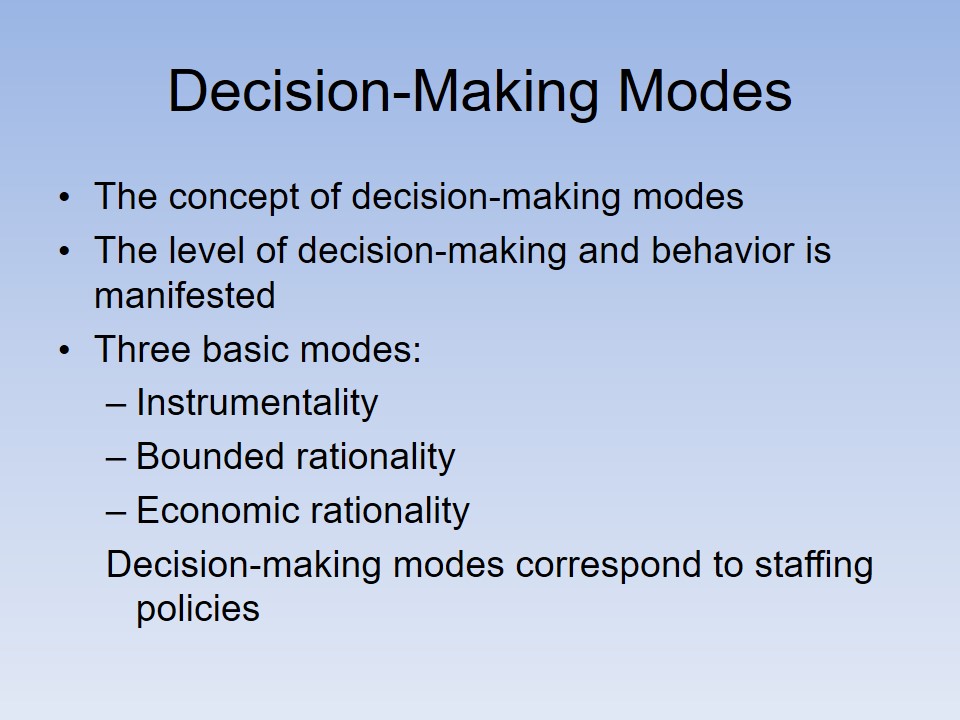
Instrumentality
- Focus on outcomes and a final result.
- Behaviors aimed at increased profits or achievement of objectives.
- Ethnocentric staffing policy correlates with instrumentality.
- Decisions are introduced to support organizations` attempts to attain goals.
- Specific set of values peculiar to this choice.
In the paper, the authors assume that the mode on instrumentality is connected with the decision making that is focused on final outcomes and results (Banai and Sama 224). In such a way, every action performed by a company or its managers is evaluated by its ability to attain a particular goal and meet existing requirements (Banai and Sama 224). In other words, behaviors aimed at the generation of profit and achievement acquire the top priority. The researchers also state that this mode of decision-making is closely connected with ethnocentric staffing policy as it reflects the organization`s desire to attain a particular goal and preserve specific values like the belief that the parent firm is a superior company that provides its subsidiaries with all needed sources (Banai and Sama 224).
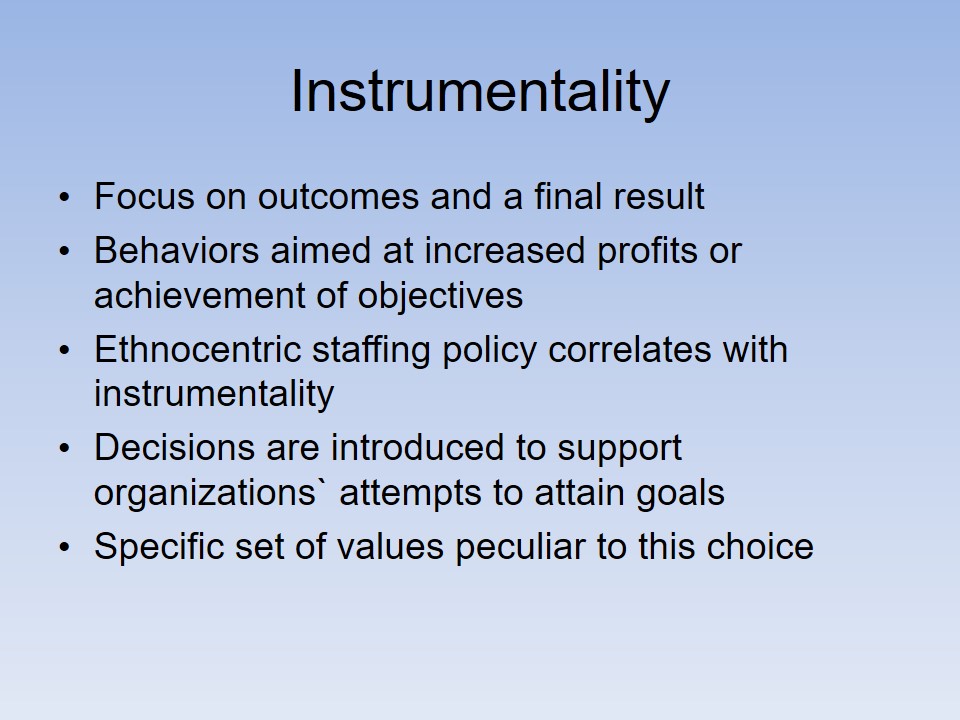
Bounded Rationality
- The mode is connected with the polycentric staffing policy.
- The choice of this policy is a rational concern.
- All business solutions have the element of rationality.
- There is the necessity of particular actions to attain desired results.
Revolving around the idea of bounded rationality and its impact on decision-making, the authors state that in the majority of cases, the choice of the polycentric staffing policy is preconditioned by satisficing model or the by the effective accomplishment of all established goals (Banai and Sama 224). In such a way, the choice of the given approach becomes closely connected with rational concerns and decision-making (Banai and Sama 224). The authors assume that even considering the fact that some solutions might demand additional effort, their ability to meet specific and rational demands might precondition their choice.
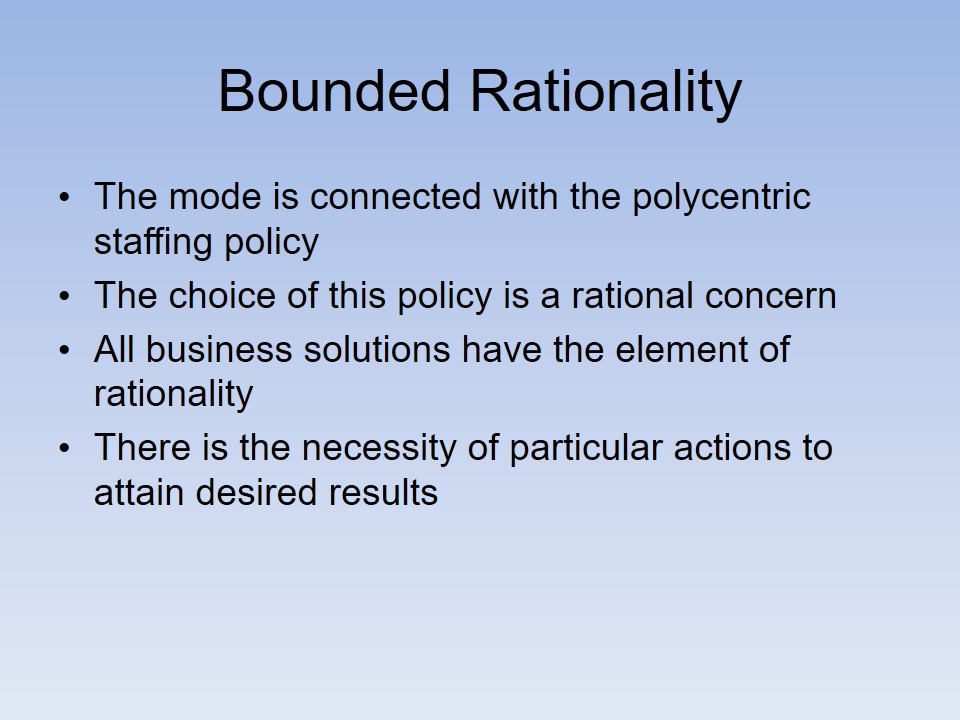
Economic Rationality
- The model is associated with geocentric staffing policy.
- Pure rationality is used to predetermine choices.
- The most efficient and cost-saving solutions are accepted.
- Disregard of the nationality helps to make the most efficient choice.
Finally, speaking about the economic rationality, the authors are sure that it is associated with the geocentric staffing policy as it is the approach that uses the ideas of pure rationality in decision-making and strategic planning (Banai and Sama 224). For instance, use of the most skilled workers regardless of their nationality and cultural peculiarities might help to create the basis for the further evolution and decreased spending. In such a way, the most efficient and cost-saving solutions are chosen within the given decision-making mode. That is why companies that use geocentric policies in their functioning also adhere to the given mode because of its correlation with their management approaches.
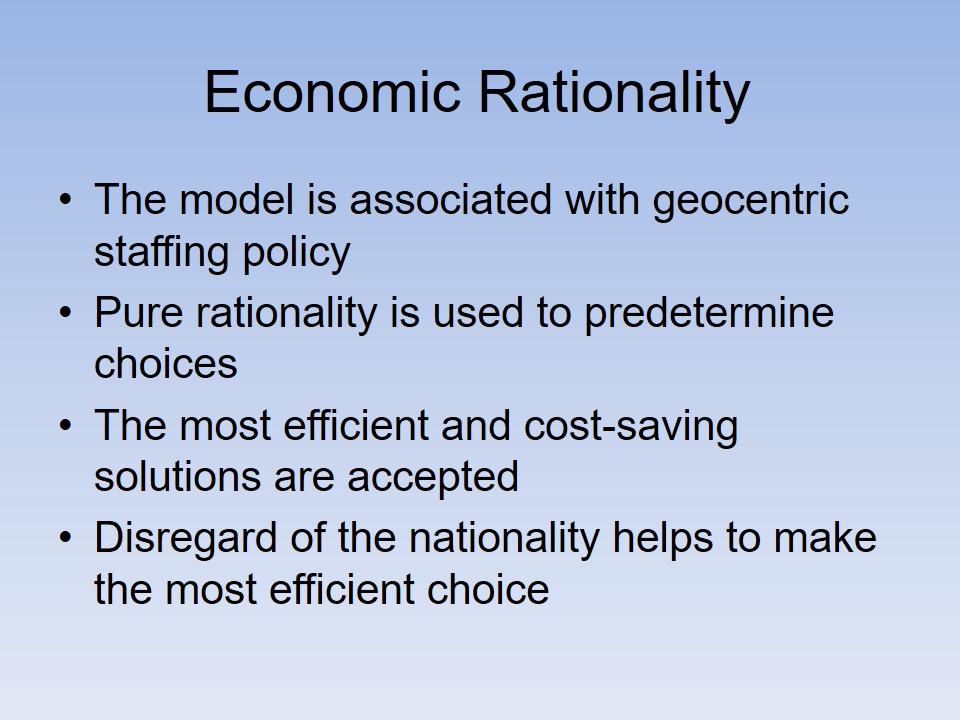
Ethical Rationales
- Three implicit ethical rationales associated with approaches to ethics:
- Distributive justice;
- Moral rights;
- Utilitarianism;
- Decision-makers might be not aware of these ideas.
- Their solutions could be considered regarding ethical rationales.
In their article, Moshe and Sama also state that there are three implicit ethical rationalities that are associated with the traditional approaches to ethic and impact the choice of staffing policies by companies (224). Thee are distributive justice, moral rights, and utilitarianism. These conceptions might remain unfamiliar to the primary decision makers in MNCs; however, they still impact the functioning of these large entities and their further development. For this reason, the solutions and choices of staffing policies should be considered regarding the suggested ethical rationalities and the potential impact they have on the further development of the company.
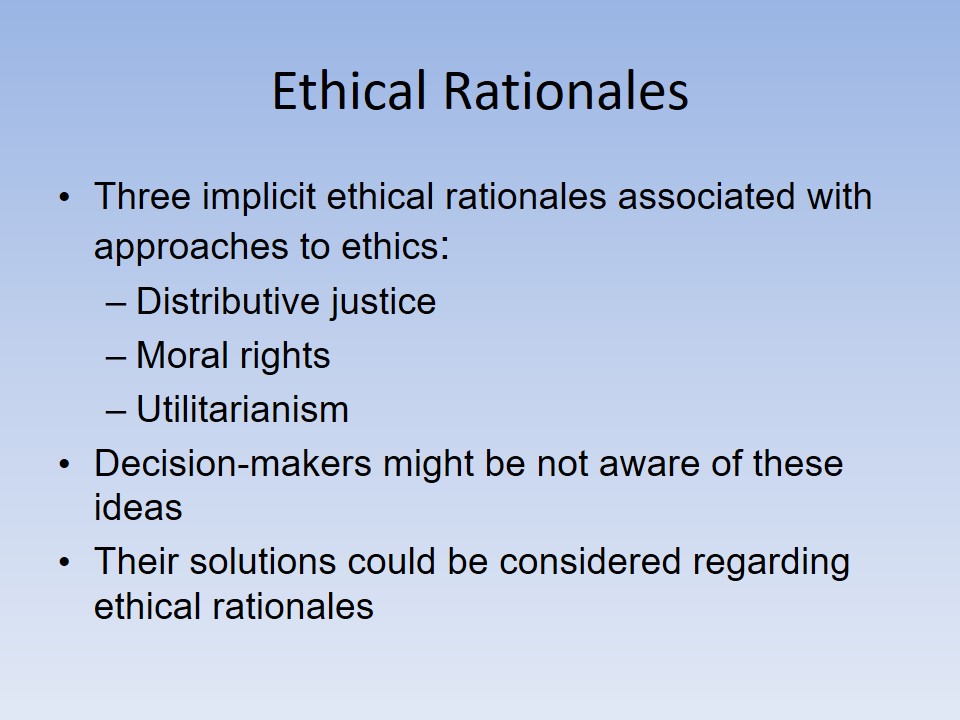
Distributive Justice
- Stands for an equitable distribution of costs.
- Benefits are given to all members of the society.
- An ethical decision should consider people`s needs.
- Differential treatment of individuals is not the only acceptable.
- Fair and justifiable relations to goals and tasks.
- Connected with the ethnocentric staffing policy.
Revolving around the idea of distributive justice, the authors state that its basic idea is the equitable distribution of all costs and privileges among the target population is the central idea of the given conception. In this regard, any decision should be considered ethical only even it takes into account people`s current needs and desires. (Banai and Sama 224). Additionally, differential treatment should be justified by a specific relationship to goals and tasks. All these peculiarities precondition the emergence of the association between the distributive justice and ethnocentric staffing policy because of the necessity to consider interests of loyal country nationals.
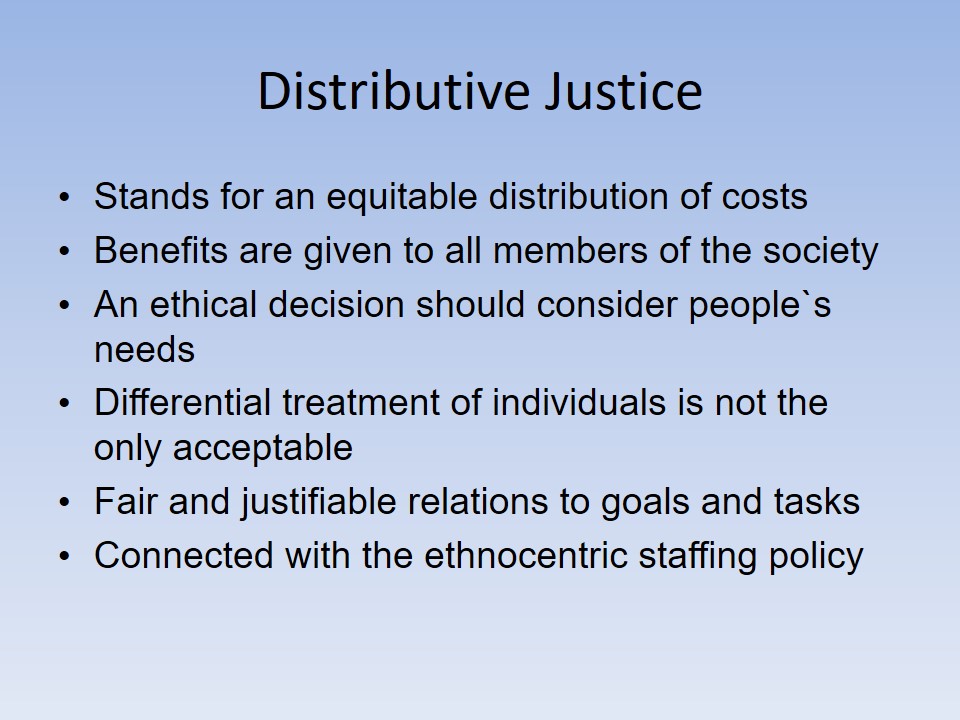
Moral Rights
- Some rights should be protected in any cases.
- Individuals should be provided with a specific treatment.
- An ethical decision should preserve human rights.
- Ethical issues regarding the protection of an individual or group`s rights.
- Correlate with the polycentric staffing policy.
Speaking about the idea of moral rights, the authors assume that this idea emphasizes the necessity to protect the basic human rights in all cases regardless of the complexity of an ethical dilemma that might appear (Banai and Sama 225). The same approach outlines the need for the introduction of a specific treatment for all individuals regardless of their status, nationality, etc. (Banai and Sama 225). It also means that any ethical decision should preserve human rights. Analyzing peculiarities of the given approach, the authors are sure that it is used in terms of polycentric staffing policy which rests on moral rights and provides both host country nationals and parent country nationals with an opportunity to acquire desired posts.

Utilitarianism
- Cultivates the idea that “good” business helps the society.
- Any ethical decision should result in greatest good for greatest number (Banai and Sama 225).
- Costs and benefits should remain balanced regarding ethical decision.
- Is associated with geocentric staffing policy.
Finally, touching upon the idea of utilitarianism and its importance for resolving ethical dilemmas in decision-making, the authors state that the given approach cultivates the idea of “good” business” that should assist communities in their evolution (Banai and Sama 225). In such a way, from the utilitarian perspective, any ethical decision should result in the generation of the greatest good that could be used by all people (Banai and Sama 225). The researchers are sure that the need for the optimization of the organizational goal attainment and enhanced efficiency peculiar to geocentric staffing policy stipulate utilitarianism`s becoming a central idea of this approach.
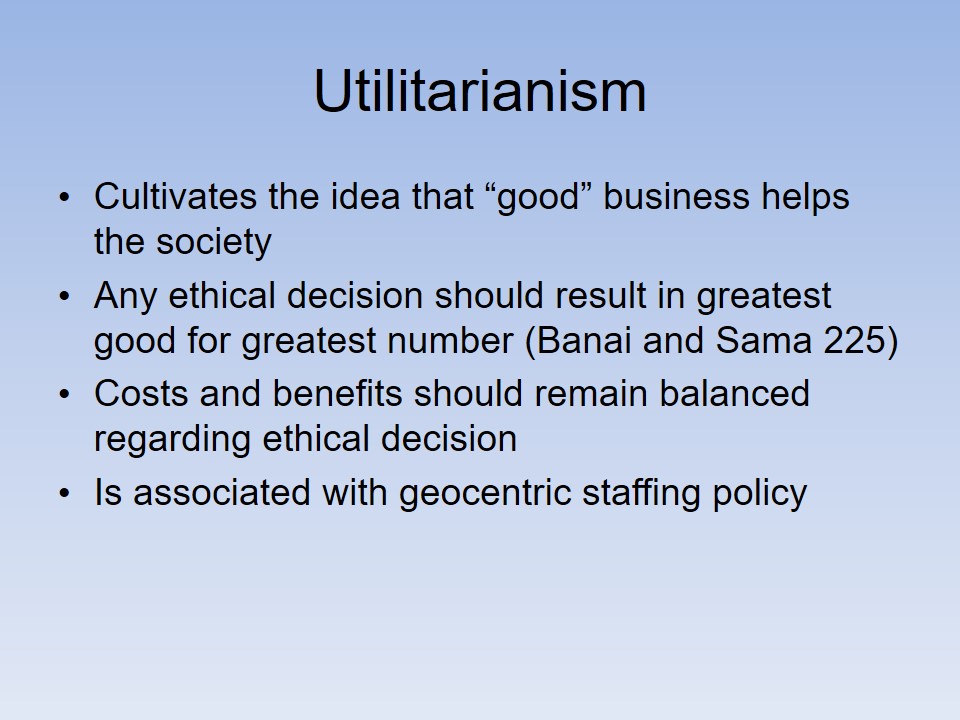
MNCs` Stakeholders
- Differ groups have diverse experiences related to the application of the policies.
- Five relevant major stakeholders` groups:
- Host country organizations;
- Host subsidiary employees;
- Expatriate and Third Country Nationals as Subsidiary managers;
- Parent country headquarter employees;
- Parent country organizations.
In the paper, the authors conclude that depending on the type of experience they undergo there are find different stakeholders` groups that play an important role in the decision making and should be considered when cogitating about ethical dilemmas related to staffing policies and their impact (Banai and Sama 225). These groups are host country organizations; host subsidiary employees, expatriate and Their Country Nationals, parent country headquarter employees, and parent country organizations (Banai and Sama 226). Regarding the selected policy and decision-making modes, they might face diverse ethical dilemmas that will apparently impact their performance, motivation, and satisfaction levels (Banai and Sama 226). For this reason, investigation of the issue should also be accompanied by the analysis of these groups` peculiarities.
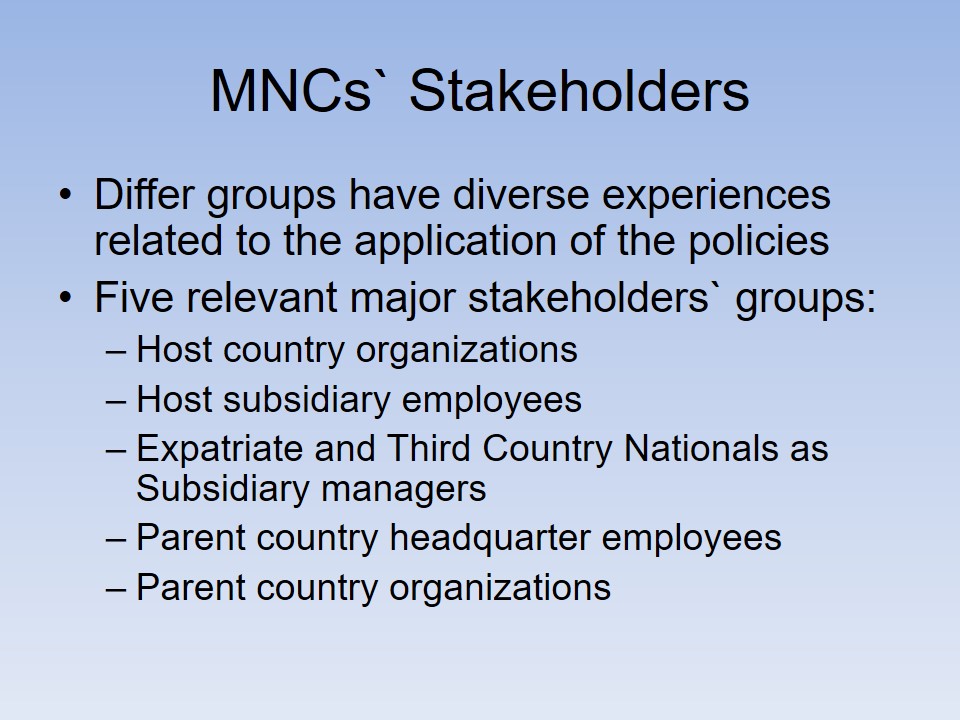
MNCs` Ethical Dilemmas
- A set of ethical dilemmas appears once a decision has been made.
- Ethical problems related to subsidiaries and employees.
- Appreciation of talent or other features like nation or culture.
- Efficiency of the selected decision-making strategies.
- Ethical concerns associated with diverse countries.
Concluding their cogitations about the choice of diverse staffing policies and decision-making modes, the authors state that once a choice has been made, the stakeholders` groups mentioned about face diverse ethical dilemmas. These are usually related to the functioning of subsidiaries and employees (Banai and Sama 226). For instance, analyzing a particular case, Moshe and Sama state that ethical rationale of moral rights suggests that local talented people deserve to be rewarded and appreciated (226). In this regard, the polycentric policy might seem the most efficient one; however, it might result in the lowered standards and emergence of other problems related to staffing. Thus, there are diverse problematic issues associated with MNCs` functioning and decision-making.
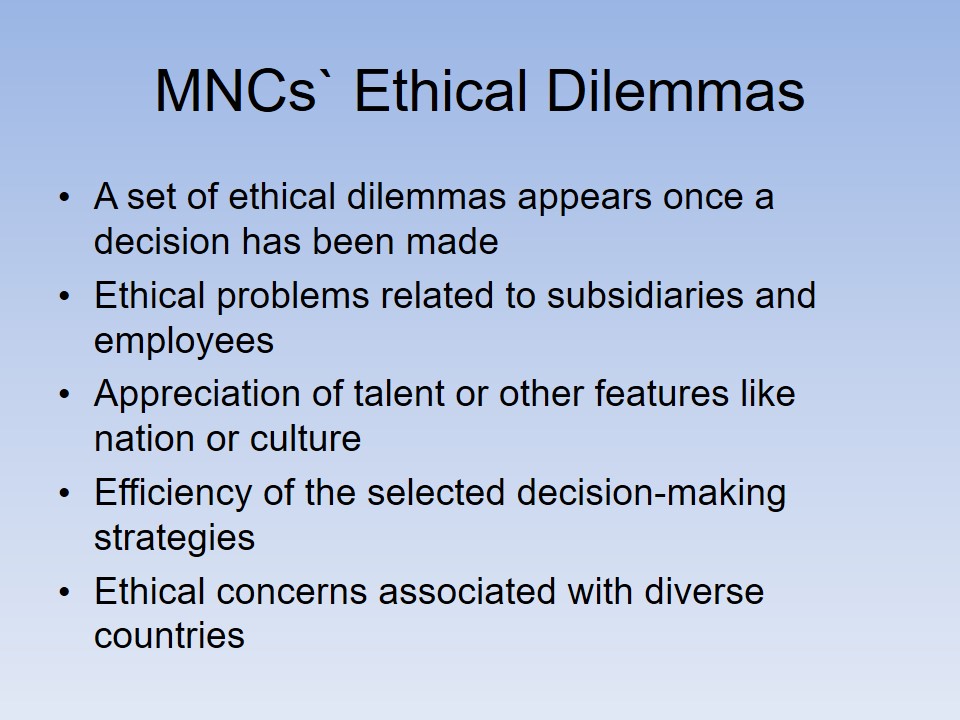
Diverse Ethical Concerns
- Multiple ethical rationale precondition differences in approaches.
- Discriminative policies providing privileges to particular groups.
- Necessity of a decision that satisfies all parties.
- High performance as one of the key factors.
- Diverse problems of stakeholders` groups.
- Other concerns.
The paper reveals another problem related to the functioning of MNCs. The fact is that using multiple ethical rationales to decide what strategy to select, corporations create the basis for the emergence of other problems (Banai and Sama 227). For instance, the adherence to the ethnocentric staffing policy might be considered a discriminative practice because of the apparent preference given to local workers and disregard of foreign specialists (Banai and Sama 229). At the same time, it might be the only efficient way to guarantee the further evolution of a company and its rise. At the same time, regarding these staffing policies, high performance is one of the central factors and, at the same time, might be disregarded. For this reason, stakeholders` groups might face diverse ethical concerns during their functioning.
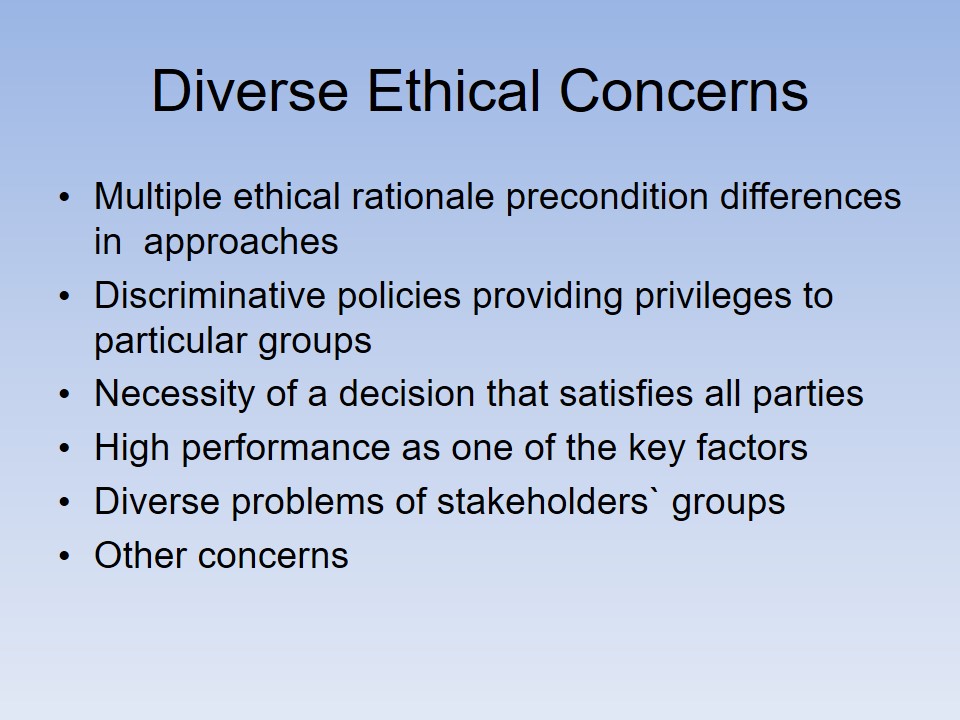
Future Research
- No ideal staffing policy resolving all ethical dilemmas.
- Necessity of a new conceptual framework.
- Business ethics as the integral part of training.
- Elaboration of the logic of conceptual framework to consider other cultures.
- Better understanding of basic ethical problems.
The authors conclude with the idea that there is not ideal staffing policy that will be able to resolve all ethical dilemmas that might appear in the course of MNCs` functioning (Banai and Sama 232). For this reason, they emphasize the necessity of the future research that will be able to facilitate the creation and investigation of a new conceptual framework that will be able to consider all cultural issues and aspects resulting in the appearance of ethical problems. Saying that business ethics still remains the part of specialists` training, the authors are sure that there is an opportunity to promote the new environment characterized by the enhanced understanding of new ideas and decision-making modes.
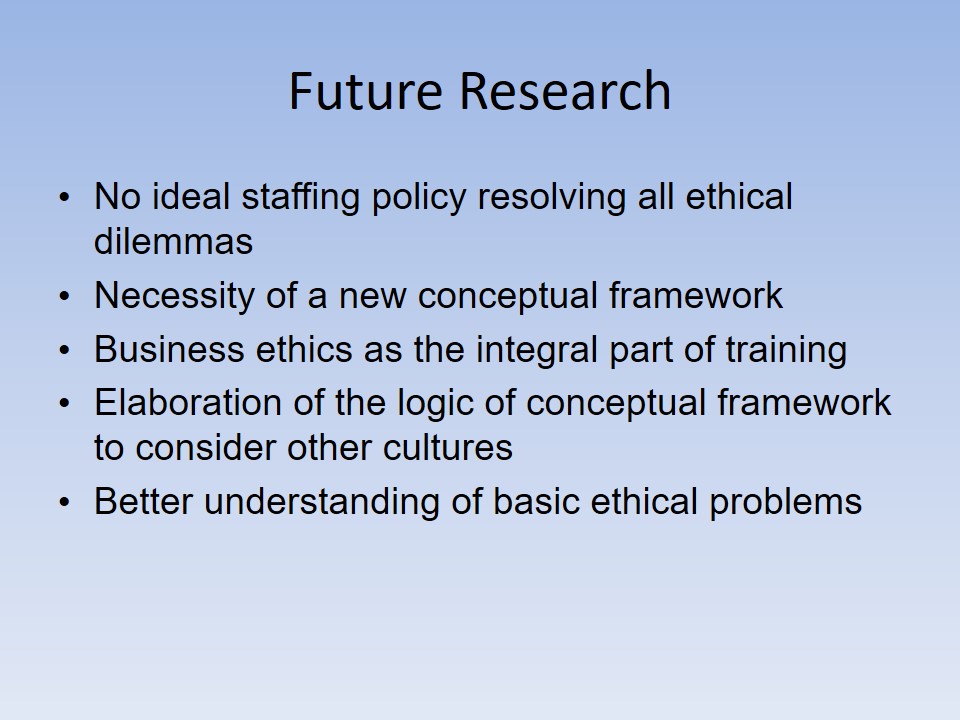
Work Cited
Banai, Moshe and Linda Sama. “Ethical Dilemmas in MNCs’ International Staffing Policies a Conceptual Framework.” Journal of Business Ethics, vol. 25, no. 3, 2000, pp. 221-235.